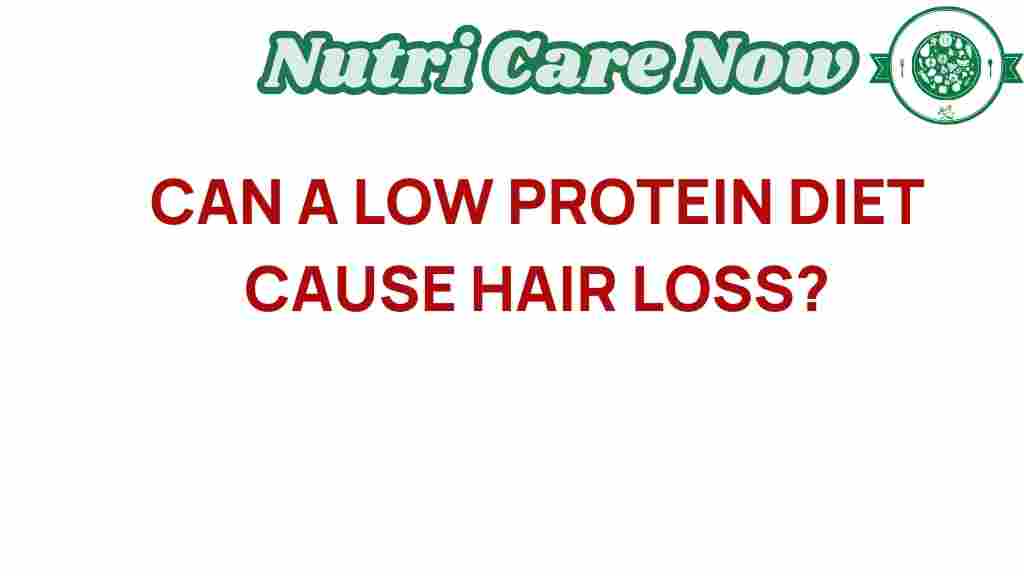Unraveling the Mystery: Can a Low Protein Diet Trigger Hair Loss?
Hair loss can be a distressing experience for many individuals. As we search for answers, the connection between our diet and hair health often comes into question. One dietary factor that has garnered attention is protein intake. A low protein diet may have significant implications for our overall health and, specifically, for the health of our hair. In this article, we will explore the relationship between a low protein diet and hair loss, delve into the importance of nutrition for hair health, and provide insights on how to maintain a balanced diet for optimal wellness.
Understanding the Role of Protein in Hair Health
Protein is a crucial macronutrient that plays a vital role in numerous bodily functions, including the maintenance and growth of hair. Hair is primarily composed of a protein called keratin. This means that adequate protein intake is essential for the following reasons:
- Supports Hair Growth: Protein provides the building blocks for hair follicles, promoting strong and healthy hair growth.
- Prevents Hair Damage: Sufficient protein helps to repair and prevent damage to the hair structure.
- Enhances Hair Thickness: A diet rich in protein can lead to thicker and fuller hair.
When the body lacks sufficient protein, it can prioritize vital functions over non-essential processes, such as hair growth. As a result, hair may become weak, brittle, and prone to falling out.
How a Low Protein Diet Affects Hair Loss
A low protein diet can lead to a range of nutritional deficiencies, which may contribute to hair loss. Here are some ways in which a protein-deficient diet impacts hair health:
- Telogen Effluvium: This is a common form of hair loss triggered by stress or nutritional deficiencies. Low protein intake can push hair follicles into the telogen (resting) phase prematurely, leading to increased shedding.
- Weak Hair Strands: Insufficient protein can weaken hair strands, making them more susceptible to breakage and loss.
- Impaired Hair Growth: A lack of protein can slow down the hair growth cycle, leading to thinning hair over time.
Identifying the Signs of Hair Loss Due to Low Protein Intake
Recognizing the signs of hair loss is crucial for addressing the issue promptly. Here are some common indicators that your hair health may be suffering due to a low protein diet:
- Increased Hair Shedding: Noticing more hair strands on your pillow or in the shower can be a sign of protein deficiency.
- Thinning Hair: A noticeable reduction in hair thickness or volume may indicate inadequate protein levels.
- Split Ends and Breakage: Weak hair that breaks easily is often a result of insufficient protein.
Step-by-Step Guide to Improving Protein Intake for Hair Health
If you suspect that a low protein diet is affecting your hair health, follow these steps to improve your protein intake:
1. Assess Your Current Diet
Start by evaluating your current dietary habits. Keep a food diary for a week to track your protein sources and overall intake. This will help you identify any gaps in your nutrition.
2. Incorporate High-Quality Protein Sources
Include a variety of high-quality protein sources in your diet. Some excellent options include:
- Lean meats (chicken, turkey, lean beef)
- Fish (salmon, tuna, mackerel)
- Dairy products (Greek yogurt, cottage cheese, milk)
- Legumes (lentils, chickpeas, black beans)
- Nuts and seeds (almonds, chia seeds, flaxseeds)
3. Consider Plant-Based Proteins
If you follow a vegetarian or vegan diet, ensure you are consuming enough plant-based protein sources. Combine different sources to achieve a complete amino acid profile. Examples include:
- Quinoa
- Tofu and tempeh
- Spirulina
- Edamame
4. Monitor Protein Intake
To maintain optimal hair health, aim to meet your daily protein needs. The recommended dietary allowance (RDA) for protein is:
- 0.8 grams per kilogram of body weight for sedentary adults.
- Higher amounts for athletes or those with higher physical demands.
5. Consider Supplementation
If you struggle to meet your protein needs through food alone, consider protein supplements. Options include:
- Whey protein powder
- Plant-based protein powders (pea, rice, hemp)
Troubleshooting Tips for Hair Loss
If you are experiencing hair loss despite improving your protein intake, consider these troubleshooting tips:
1. Evaluate Other Nutritional Deficiencies
Hair health is influenced by various nutrients, not just protein. Ensure you are also getting enough:
- Iron: Important for oxygen transport to hair follicles.
- Vitamin D: Plays a role in hair follicle cycling.
- B vitamins: Essential for energy metabolism and hair growth.
2. Manage Stress Levels
Stress can exacerbate hair loss. Incorporate stress-reducing practices such as:
- Meditation
- Yoga
- Regular exercise
3. Seek Professional Help
If hair loss persists, consider consulting a healthcare provider or a registered dietitian. They can help identify underlying issues and develop a tailored nutrition plan to support your health.
Conclusion: Prioritizing Protein for Optimal Hair Health
In conclusion, a low protein diet can indeed trigger hair loss by compromising the structural integrity of hair and disrupting the hair growth cycle. Adequate protein intake is essential not just for hair health but for overall wellness. By understanding the role of nutrition in maintaining healthy hair, you can take proactive steps to enhance your diet and minimize the risk of hair loss.
Remember, maintaining a balanced diet rich in high-quality protein sources, alongside proper stress management and other nutritional considerations, can significantly improve your hair health. For more detailed nutritional advice, consider consulting a registered dietitian to create a personalized plan suited to your needs.
Make sure to prioritize your health and nutrition, as it is closely linked to your overall well-being and the vitality of your hair.
This article is in the category Health and created by NutriCareNow Team
